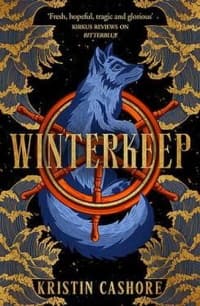
Winterkeep by Kristin Cashore
(Gollancz, 2021)
Reviewed by Anne F. Wilson
Queen Bitterblue of Monsea sets off on a diplomatic voyage to the far country of Winterkeep, where some of her people have disappeared. By the time her ship reaches port, she has vanished. This throws both the Monseans and their hosts into disarray. Does somebody, somewhere, know what has happened? Winterkeep is the fourth in the author’s young adult Graceling series. Each is a stand-alone, but characters recur, and it helps to have read the previous books. I had read these, but so long ago that I didn’t remember a lot about them, and the chapters dealing with the backstory of Monsea are a bit info-dumpy and stuffed with names that I kept having to look up in the character list.
However, the chapters dealing with the situation on Winterkeep and introducing an entirely new set of characters, were lively and entertaining, and as soon as the two sets of characters get together and start interacting the book really takes off. I say characters rather than people, because one of the great charms of the book is the set of non-human characters, from the grumpy monster at the bottom of the sea who is (definitely not!) the legendary Keeper, to the telepathic blue foxes who may adopt and communicate with a human if they really like them.
Monsea is part of the Royal Continent, where the realms have suffered under absolute monarchs for many years, and some of which, after revolutions, are developing new forms of government. Bitterblue herself and her court have suffered dreadfully through her father’s reign. But Winterkeep is a long-standing democracy. Surely everything here must be fair and above-board?
Lovisa Cavenda is a student at Winterkeep Academy. Her parents each represent one of the two main parties in Parliament, which is currently deadlocked over one issue. The Scholars want to keep Winterkeep free of industrial pollution (whilst selling polluting minerals to their neighbours). The Industrialists want the advantages of using the minerals themselves. This isn’t entirely logical, but then neither are the politics of energy and conservation in our world.
Lovisa is not an endearing character, being a sneak and a liar, but we come to appreciate how her character has been formed by her family’s disastrous dynamics, and that she is trying to do her best in very difficult circumstances. Gradually she realises that her family are not only dysfunctional, but involved in something dark and dangerous. What should she do? What, indeed, can she do?
Lovisa watches the people around her and their interactions and learns from them. She is starting to realise that people who are nice to you aren’t always your friends, and people who aren’t may be so for good reason. She watches and tries to keep the people that she cares for safe. But when it comes to the crunch, will she be able to act to change things?
A major theme of the book is abuse. How to survive it, and how, having survived, not to be deformed by it but to become a fully-developed human being (or fox, or undersea monster). Bitterblue is a survivor, but in Winterkeep she is forced back into a situation where she has no control. Will she be able to stay strong?
I really enjoyed this book. It has tremendous narrative drive, and a plot that kept me guessing. It is also cheering to read about societies where there is no obvious sexism, and where people’s sexuality depends on their own inclinations. Effective contraception is freely available, and there’s no societal prohibition on young people exploring sex. People are not classified based on their skin colour, though there are other prejudices, and poor people are always at the bottom of the pile. Cashore tries to portray people working towards a better society, and, if she has a message, it’s that people can change, if they choose to, and work at it.
Review from BSFA Review 14 - Download your copy here.
